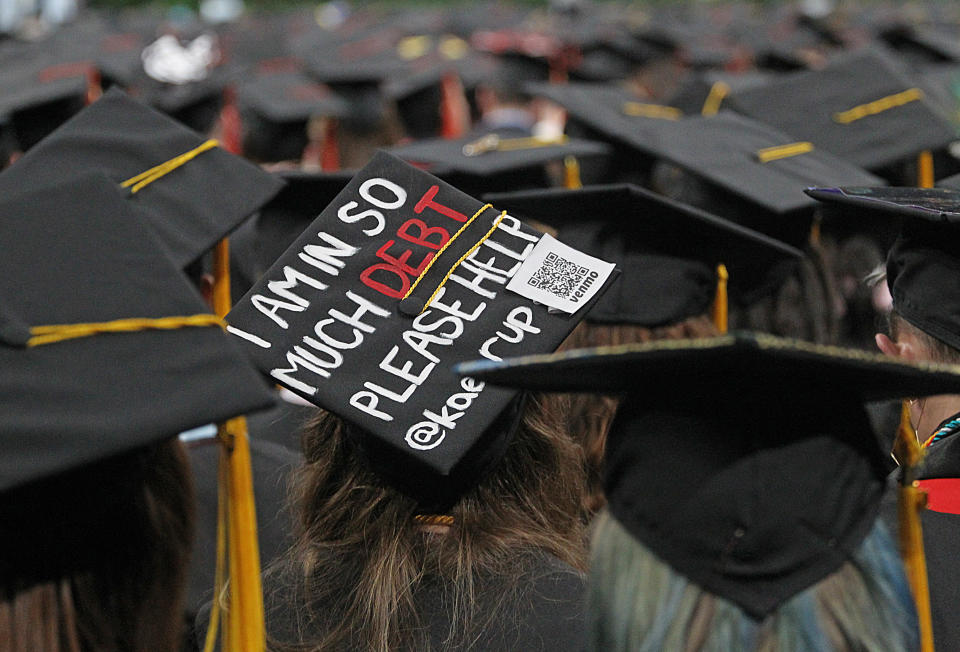3 reasons why refinancing your student loans may not be right for you
Jake Northrup is a certified financial planner, certified student loan professional and chartered financial analyst. He is also the founder of Experience Your Wealth LLC in Rhode Island.
Student debt is the fastest rising debt in America, hitting $1.51 trillion in the third quarter of last year. To put that in perspective, the federal student loan balance in the U.S. exceeds the value of all goods and services produced by Spain, the 13th largest country in the world.
The vast majority — 71% — of all federal student loan debt is held by people between the ages of 25 and 49, which has a dramatic impact on their financial decisions.
While undergraduate direct federal loans currently carry a reasonable interest rate of 4.53%, graduate federal loans are much more expensive. Direct unsubsidized loans for graduate school cost 6.08% and direct PLUS loans for graduate school cost 7.08%.

Since direct unsubsidized loans have borrowing limits, many people attending graduate school are forced to also borrow direct PLUS loans. These rates are set by the federal government and do not change during the life of the loan.
Many borrowers are constantly searching for ways to reduce this burden on their financial life. This is where private refinancing comes in.
What is private refinancing?
Private refinancing is when you receive a new loan from a private bank that is used to pay off your existing federal loans. Unlike federal loans, the private bank provides a customized interest rate based on your income and credit history.
There are many banks that specialize in student loan refinancing — Earnest, Laurel Road, Commonbond, SoFi, and First Republic, among others. The banks issue a fixed or floating interest rate that is likely lower than the rate on your federal loans. This lower rate can save you interest over the life of the loans.
But this reduction comes at a cost that you should carefully weigh before you decide to refinance.
You forfeit forgiveness options
Federal student loans offer both tax-free and taxable student loan forgiveness after making payments on an income-based repayment plan for a set amount of time.
Tax-free loan forgiveness, called Public Service Loan Forgiveness (or PSLF), requires that you make 120 qualifying monthly payments, under a qualifying repayment plan, while working full-time for a qualifying employer.
This strict requirement alone explains why 99% of the most recent applications for PSLF were denied. You need the right type of loans, while on the right type of repayment plan, while working for the right type of employer.

You must have direct public loans on an income-based repayment plan and work for a 501c3 nonprofit organization or a state, local or federal government for your payments to qualify for PSLF. If you meet all the criteria and strict record-keeping requirements, your remaining student loan balance is forgiven tax-free at the end of the 120-month period.
Taxable student loan forgiveness is another option for borrowers who don’t meet the PSLF criteria. You must have a student loan balance remaining after making 20 or 25 years of payments, depending on the repayment plan. This can be a feasible option for borrowers with a student loan balance that well exceeds their income.
For example, if you have a student loan balance of $100,000 and a starting salary of $50,000, it makes sense to review whether or not taxable student loan forgiveness is applicable for you.
If you select an income-based repayment plan, your monthly payments are structured to be roughly 10% of your monthly income. This can actually cause your student loan balance to grow — called negative amortization — if your monthly payments are less than the amount of interest that is being charged on your student loans.
While this may seem alarming to borrowers, it could actually result in thousands of dollars of savings in the future versus paying down your student loans as quickly as possible. If you refinance your loans, you lose these important provisions that can save you thousands of dollars.
You lose flexibility
Federal student loans offer more flexible payment arrangements compared with private student loans. If you’re on an income-based repayment plan and your income suddenly drops, you can reduce your student loan payments all the way to zero, which helps your cash flow.
This feature is important for people who may have income that fluctuates. Their loan payments will always be a certain percentage of their income, and most repayment plans put a ceiling on the payment amount.
If you lose your job for an extended period of time, you can also put your loans into unemployment deferment. That means your subsidized loans won’t accrue extra interest.
If you refinance your loans, you generally lose these provisions. Some private banks offer deferment features, but it’s usually less flexible compared with federal student loans.

You may need a co-signer
Depending on your income and credit history, a bank may require you to add a co-signer to your private student loans. This person would then become legally responsible for paying the student loan balance if you can’t.
Often, co-signers don’t fully understand what they’re signing up for. Unlike public student loans, private ones may not go away in the event of bankruptcy, disability or death. This can result in a heavy burden for a co-signer they weren’t expecting.
Depending on the bank, you could qualify for a co-signer release after a certain period, but that varies on a case-by-case basis.
What should you do?
Refinancing your student loans is a big decision. It’s important to understand the various features of federal student loans that you would give up if you refinance.
While the potential interest savings on private loans is attractive, you need to first evaluate whether loan forgiveness is possible for you. You may have already made progress toward loan forgiveness without knowing it.
Disclosures
None of the information provided is intended as investment, tax, accounting or legal advice, as an offer or solicitation of an offer to buy or sell, or as an endorsement, of any company, security, fund, or other securities or non-securities offering. The information should not be relied upon for purposes of transacting securities or other investments. Your use of the information is at your sole risk. The content is provided ‘as is’ and without warranties, either expressed or implied. Experience Your Wealth, LLC does not promise or guarantee any income or particular result from your use of the information contained herein.
Read more information and tips in our Student loans section
Read more personal finance information, news, and tips on Cashay




